Military Vaccine List Basic Training: Essential Immunizations for New Recruits
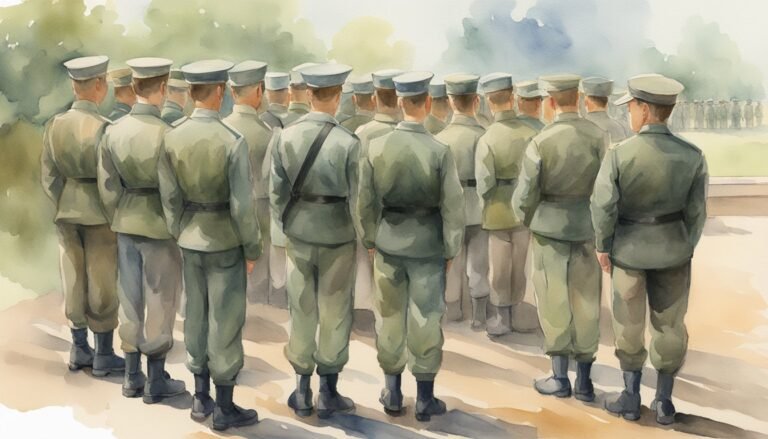
When you join the military, one of the first things you’ll encounter during basic training is a series of mandatory vaccinations.
These vaccines are crucial for maintaining the health and readiness of all service members. You will receive vaccines for diseases like measles, mumps, rubella (MMR), and the quadrivalent meningococcal vaccine, among others.
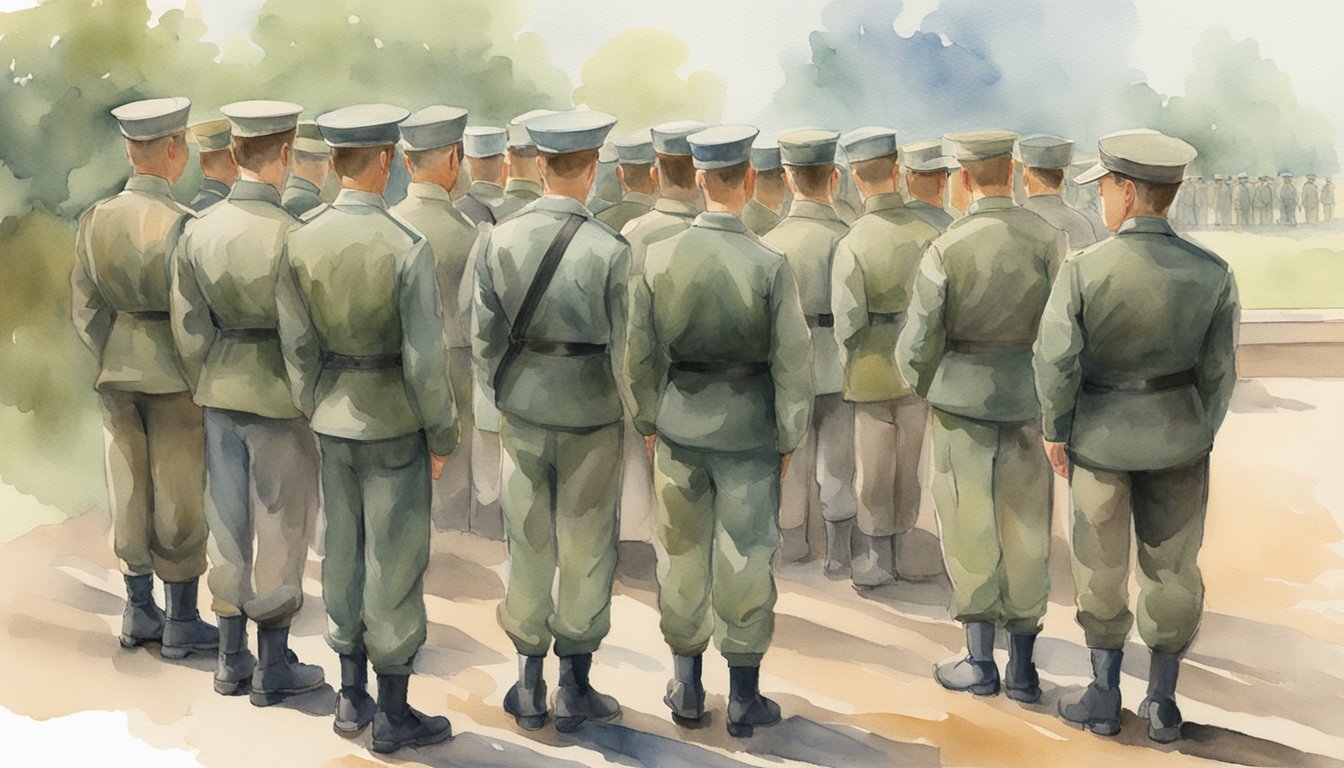
Vaccinations in the military are not just about protecting individual soldiers but also about ensuring the overall effectiveness of the troop.
By the time basic training ends, you will have received multiple vaccinations to protect against various diseases. Knowing which vaccines are required can help you prepare for what to expect and understand why these shots are necessary.
It’s essential to keep track of these vaccinations as they are part of your military medical records.
This can be important for future deployments and any medical procedures you might need down the line.
Being informed about your vaccine schedule helps you stay ready and ensures you meet all military health standards.
Key Takeaways
- You will receive several mandatory vaccines during basic training.
- Vaccinations are crucial for individual and troop health.
- Keeping track of your vaccinations is important for future deployments.
Understanding Military Vaccinations
Military vaccinations are crucial for ensuring the health and readiness of service members.
These vaccinations protect against various diseases and are administered during basic training to create a safe environment for all personnel.
Purpose of Vaccinations in the Military
Vaccinations in the military serve several important purposes. Protecting health is the main goal.
Recruits are often housed in close quarters, making them more vulnerable to infections.
Vaccinations help prevent outbreaks of diseases that could spread quickly in such environments.
Readiness and deployment are also key factors.
Service members may be sent to areas where certain diseases are more common.
By vaccinating, the military ensures that personnel are protected against regional health risks.
Compliance with public health guidelines is another reason.
The military follows guidelines from organizations like the CDC to keep personnel safe from preventable diseases.
Common Vaccines Administered
During basic training, you will receive several important vaccines.
The Measles, Mumps, and Rubella (MMR) vaccine is given to all recruits to protect against these contagious diseases.
The Adenovirus vaccine helps prevent respiratory illnesses that are common in close-contact settings.
This vaccine is administered as a tablet.
The Quadrivalent meningococcal vaccine protects against meningitis caused by four different types of bacteria.
This vaccine is essential for preventing outbreaks of meningitis, especially in crowded living conditions.
Recruits may also get vaccines for seasonal flu, hepatitis A and B, and tetanus-diphtheria.
Each vaccination is chosen based on its effectiveness and the specific risks faced by military personnel.
Military Vaccine Policies
The Department of Defense (DoD) sets strict guidelines for vaccines in the military to protect service members’ health and readiness.
Some vaccines are mandatory for all, while others depend on specific duties or regions.
Department of Defense Regulations
The Department of Defense (DoD) has laid down detailed policies for immunizations.
These are aimed at maintaining the health of service members.
The primary document is AR 40-562, which encompasses guidelines for immunization and chemoprophylaxis.
The Secretary of Defense ensures that these policies are enforced.
This includes timelines for vaccines and the logistics of administering them.
These policies are vital to prevent outbreaks and maintain operational effectiveness.
The DoD also mandates record-keeping for each service member’s vaccination status.
This ensures that all individuals are compliant.
You can see more about these regulations in the Immunization Healthcare Division.
Mandatory vs. Optional Vaccines
Mandatory vaccines include those for diseases like measles, mumps, rubella, and quadrivalent meningococcal.
These are required at the basic training stage.
This is because new recruits are at high risk for infectious diseases when they first join.
Optional vaccines depend on the service member’s role and deployment location.
For instance, those deploying to areas with a risk of yellow fever may need that vaccine.
The policy is flexible to address specific health threats as they arise.
To understand the specific vaccines you will get during Army Basic Training, the Army Shots List provides detailed information.
These lists are updated regularly to include new health guidelines and vaccine recommendations.
Vaccine Schedule During Basic Training

During basic training, you’ll receive several essential vaccines to ensure your health and readiness.
These shots protect you from various diseases and are mandatory for all recruits.
Initial Immunizations
At the start of basic training, you will get vaccinated against various infectious diseases.
This includes the Measles, Mumps, and Rubella (MMR) vaccine regardless of your vaccination history.
You will also receive the Quadrivalent meningococcal vaccine, covering strains A, C, Y, and W-135.
This is administered once, soon after you arrive for training.
Furthermore, a live virus tablet for Adenovirus Types 4 and 7 is given to prevent respiratory illnesses.
Additionally, shots like Tetanus and Diphtheria (Td) are part of the initial immunization process in basic training to boost your immunity against these diseases.
For more details, you can visit the Army Shots List or the Military Vaccine List.
Service Members and Vaccine Administration

Military members, whether active duty, reserve, or National Guard, undergo strict immunization protocols.
These protocols are crucial for operational readiness and overall health.
Different roles in vaccine deployment ensure that service members are effectively vaccinated.
Roles in Vaccine Deployment
Administrative personnel manage the records and scheduling of vaccinations.
They ensure that all service members receive the correct vaccines at the appropriate times.
Proper record-keeping is vital for tracking immunization status and ensuring compliance with military guidelines.
Medical staff play a direct role in administering the vaccines.
They are responsible for handling the vaccines correctly, from storage to injection.
Medical personnel also monitor for adverse reactions and provide care if needed.
Active duty, reserve, and National Guard members all receive vaccines, but the schedule and specific requirements can vary.
Active duty members typically get vaccinated during initial training and regular medical checkups.
Reserve and National Guard members receive their vaccines during training weekends and before deployment.
Overall, a well-coordinated approach between administrative and medical roles ensures that all service members are immunized effectively, maintaining the overall health and readiness of the military force.
For more detailed guidelines, check out the Army Shots List.
Exemption and Waiver Procedures
In basic training, some recruits may be eligible for exemptions from mandatory vaccinations due to medical or religious reasons.
This section details the procedures for obtaining these exemptions and what factors are considered.
Medical Considerations
Medical exemptions are granted when a recruit has a recognized health condition that prevents them from safely receiving a vaccine.
Health professionals evaluate medical history and current health status.
If you have severe allergies to vaccine components or conditions like an immunodeficiency, you may be eligible.
Consultation with a healthcare provider is necessary to validate these exceptions.
You can reach out to the DHA Immunization Healthcare Support Center for guidance.
Religious Considerations
For religious exemptions, you will need to provide evidence of sincerely held religious beliefs that prohibit vaccinations.
This often involves submitting a written statement explaining your beliefs and how vaccinations conflict with them.
Documentation from a religious leader may also be required.
The Army Regulation 600-20 and AR 40-562 outline the procedures.
Each request is reviewed on a case-by-case basis to determine eligibility.
If approved, you are still required to follow other health and safety protocols.
Preparing for Deployment
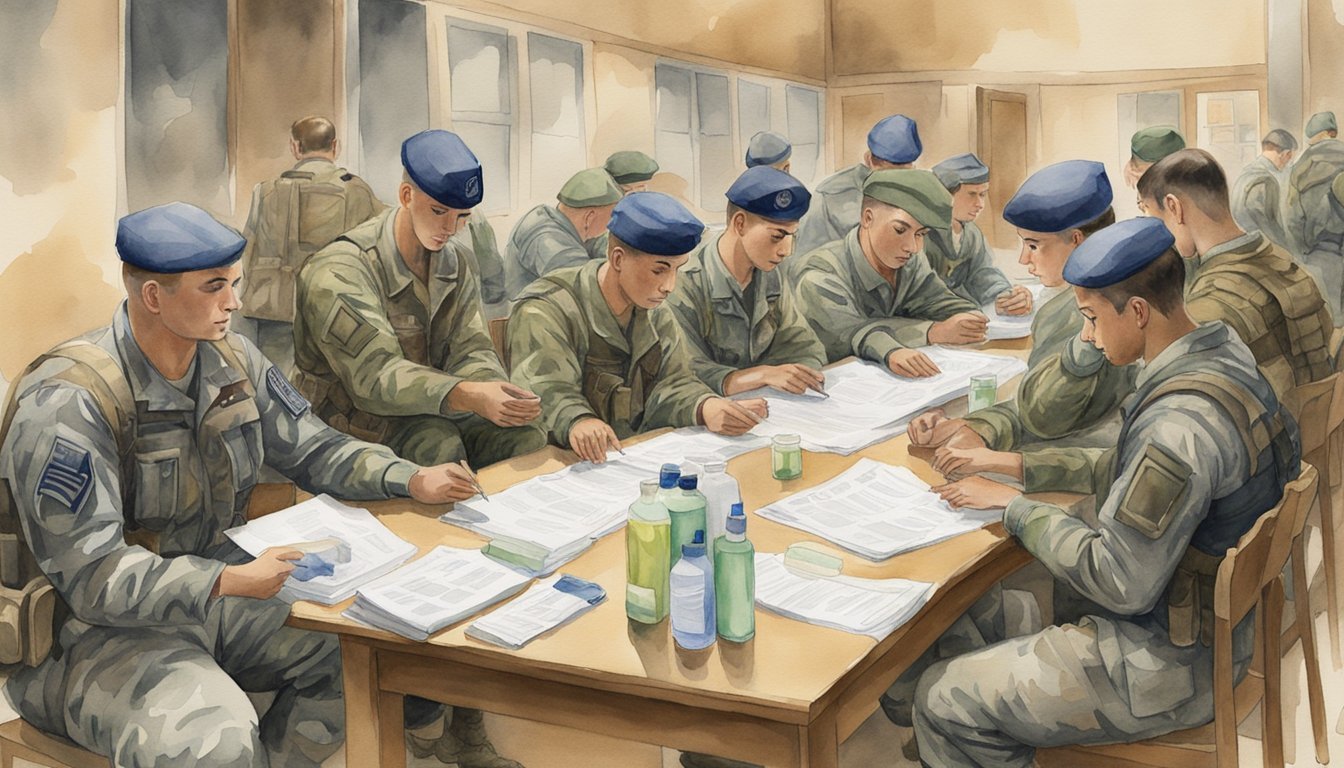
Before deployment, it’s crucial for military personnel to receive specific vaccines.
These vaccines help protect soldiers against diseases they may encounter in different parts of the world.
Vaccines for Overseas Deployment
When traveling for deployment, certain vaccines are mandatory.
For example, yellow fever and Japanese encephalitis vaccines are essential for deployments to areas where these diseases are common.
In addition, hepatitis B, typhoid, and rabies vaccines may be required depending on the destination.
These vaccines are crucial for protecting you from diseases found in specific regions.
Make sure all your vaccinations are up to date before you leave.
Different regions have different vaccine requirements, so it’s important to consult your healthcare provider for advice.
Keep documentation of all your vaccinations, as some destinations may require proof upon entry.
Specific Vaccines and Associated Risks
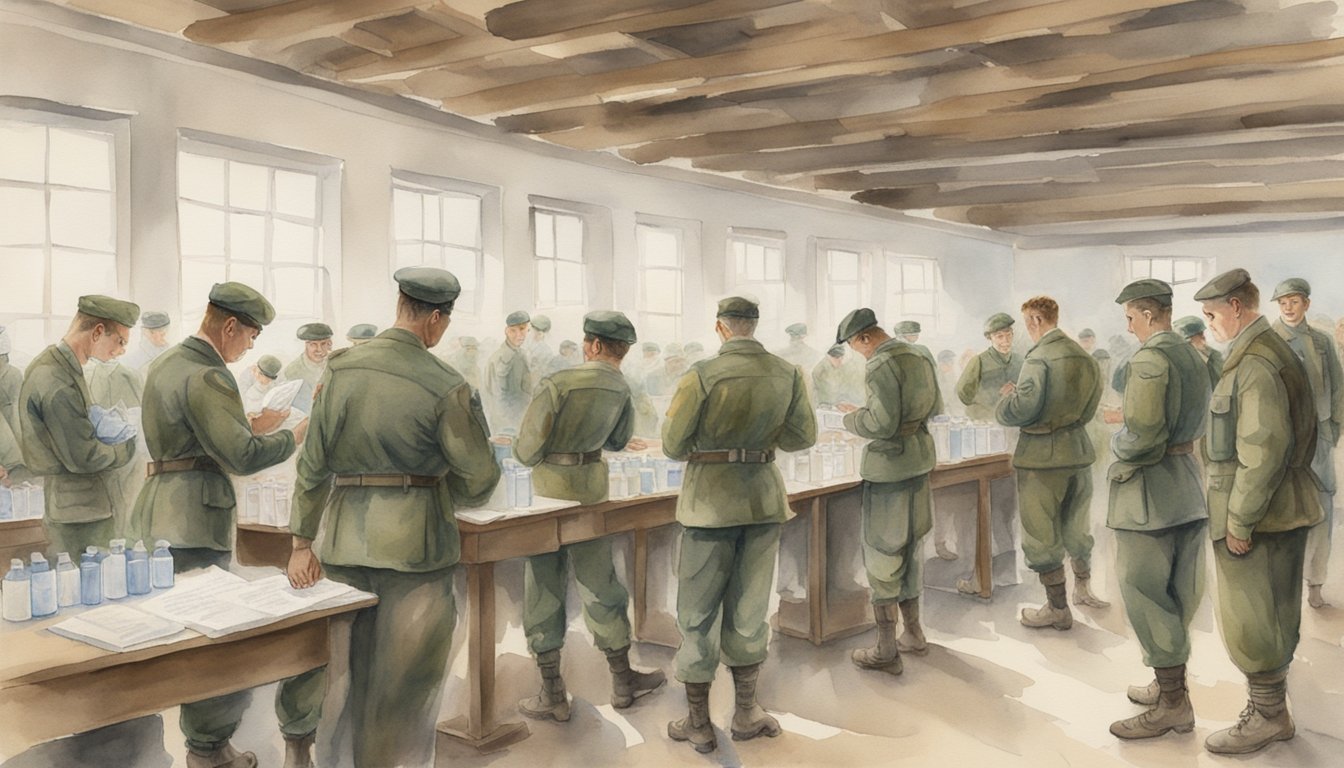
Military personnel receive various vaccines to protect against serious diseases.
Knowing the specific vaccines and their potential risks helps you understand what to expect during basic training.
Anthrax and Smallpox Vaccines
The anthrax vaccine helps prevent a severe bacterial infection that can be used as a biological weapon.
It is given in a series of shots.
Side effects can include soreness at the injection site, mild fever, and muscle aches.
Serious reactions, though rare, can occur and might include severe allergic responses.
The smallpox vaccine protects against the smallpox virus, a deadly disease that has been eradicated but remains a concern for bioterrorism.
This vaccine is a live virus shot.
Side effects can include mild rash, fever, and fatigue.
Serious risks might involve heart problems and severe skin reactions, though these are uncommon.
Routine Vaccines For Military Personnel
Routine vaccines include those for measles, mumps, and rubella (MMR), adenovirus, and varicella (chickenpox).
The MMR vaccine prevents infections that can cause fever, rash, and other serious health issues.
Side effects typically include mild fever and rash.
Severe allergic reactions are rare.
The adenovirus vaccine is taken orally and helps prevent respiratory illnesses.
Common side effects involve mild gastrointestinal issues.
The varicella vaccine protects against chickenpox, a highly contagious viral infection.
Side effects are usually mild and may include soreness at the injection site and low-grade fever.
Serious side effects are rare but can include severe allergic reactions.
Understanding these vaccines and their associated risks helps you prepare for the health requirements of military service.
COVID-19 Vaccinations in the Military
The military has taken significant steps to ensure all personnel are vaccinated against COVID-19.
This includes issuing the FDA-approved vaccines and providing detailed guidance on vaccine storage, handling, and administration.
Vaccination Response to Pandemics
The COVID-19 pandemic posed a major challenge for the military.
Maintaining a healthy force is crucial, so the Department of Defense (DOD) quickly added COVID-19 vaccines to the list of required shots for recruits.
The Pfizer vaccine is among those administered, helping to reduce infection rates and transmission.
At places like Lackland Air Force Base, Basic Military Training (BMT) trainees can receive the vaccine during their training.
This ensures they are fully vaccinated by the time they graduate.
This measure allows for safer interactions with visitors and decreased risk of outbreaks within training units.
Additionally, the military has set up resources like the CDC COVID-19 Vaccine Training Center to educate healthcare providers on proper vaccine administration.
This includes understanding Emergency Use Authorizations and following guidelines for vaccine storage and safety.
Understanding Vaccination Records
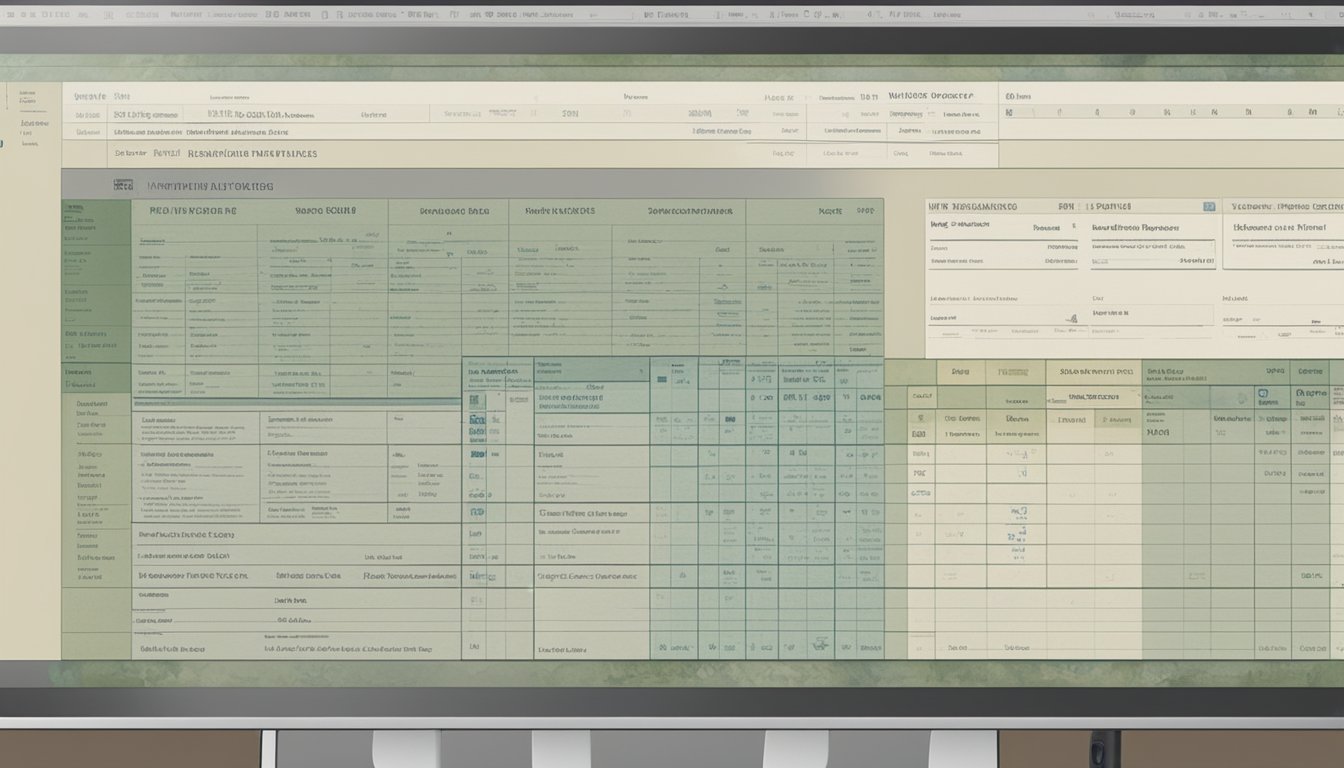
Accurate vaccination records are crucial for tracking immunization history and ensuring the safety and readiness of military personnel.
These records help in maintaining health standards and complying with CDC guidelines.
Importance of Accurate Records
Keeping accurate documentation of your vaccination history is vital for both you and your community.
In the military, records are stored in an electronic database that can be accessed by authorized personnel.
This ensures that you receive the necessary immunizations and that there’s no duplication or omission.
Family and Community Health:
Your vaccination status also affects your family and community.
Accurate records help in minimizing the spread of diseases, protecting vulnerable populations, and ensuring public health.
Regular updates to vaccination records are essential.
This not only helps in individual medical care but also improves overall military health readiness.
Support and Resources for Service Members

Service members have access to a range of support and resources to ensure their health and well-being during and after basic training.
These services are designed to address both immediate medical needs and long-term health concerns.
Medical and Support Services
The Immunization Healthcare Division ensures that military personnel receive all necessary vaccines for their protection.
This division is based on military immunization policy and national recommendations.
You can learn more about specific vaccines and guidelines from their comprehensive resource booklet.
Each branch, including the Marines, Navy, and Army, has access to medical support through the office of the Surgeon General.
This office provides comprehensive medical care, ranging from routine checkups to emergency treatment.
In addition to medical support, service members also receive assistance from various mental health and wellness programs.
These programs offer counseling, stress management, and other resources to help you maintain your mental well-being.
Deployment Health Clinical Centers offer specialized care to address issues that arise during or after deployment, such as combat stress and PTSD.
You can schedule appointments and access resources through their official sites and local offices on base.
For COVID-19 vaccinations, mandatory policies are in place across all branches, including the Department of Defense’s directives.
These are part of broader efforts to maintain the health and readiness of the force.
Military Readiness and Vaccination
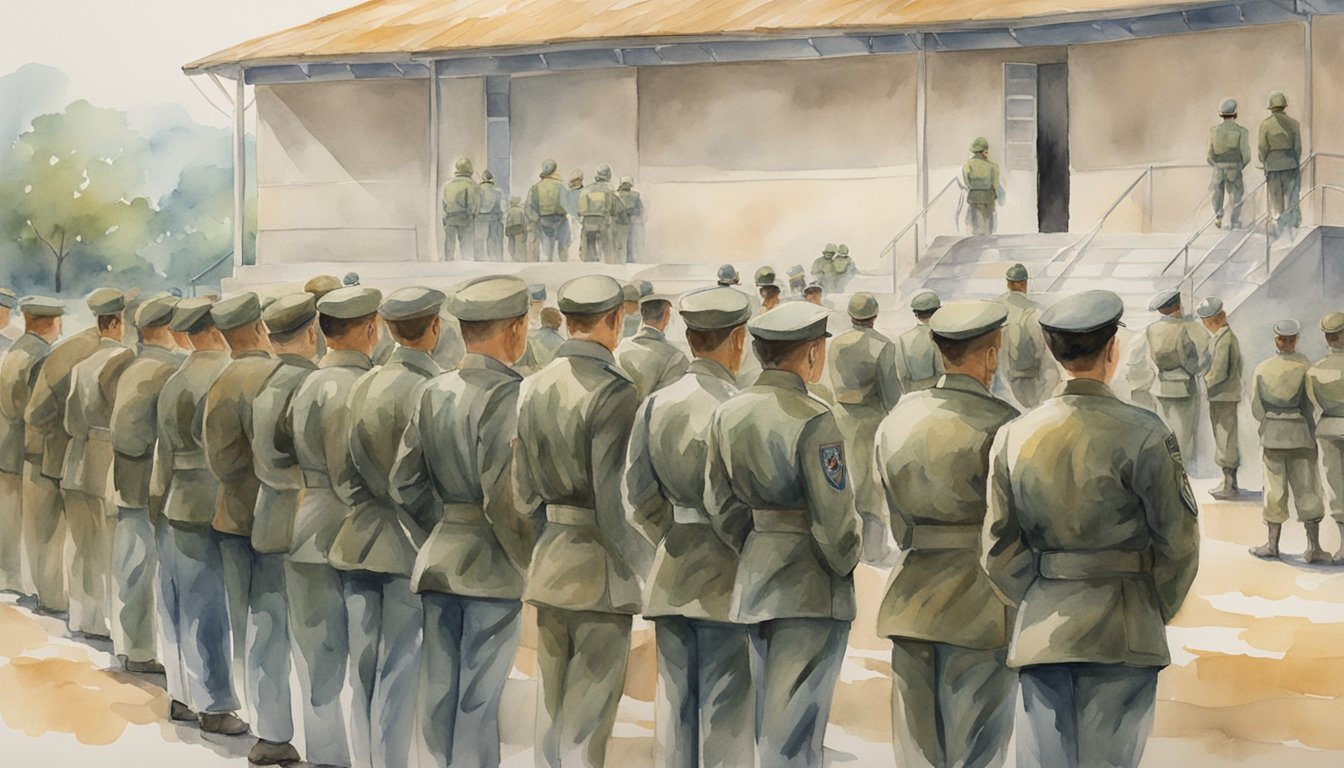
Vaccinating military personnel is crucial to maintaining readiness and ensuring that troops can deploy quickly and safely.
Immunizations keep forces healthy, which is essential for operational effectiveness.
The Role of Vaccinations in Military Preparedness
Vaccinations play a vital role in military preparedness.
They protect troops against diseases that can spread quickly in close quarters.
This reduces sickness and keeps forces ready for deployment at any time.
One key vaccination is the quadrivalent meningococcal vaccine.
This immunization is crucial because meningitis can cause severe illness, which could incapacitate troops.
The military vaccine list includes many vaccines needed for basic training, such as the Measles Mumps and Rubella (MMR) vaccine and the Adenovirus types 4 and 7 vaccine.
Military personnel also follow the Joint Regulation on Immunization and Chemoprophylaxis for the Prevention of Infectious Diseases, ensuring standardized procedures for up-to-date vaccinations.
Ensuring troops have all required shots keeps the force healthy and ready to deploy anytime.
Frequently Asked Questions
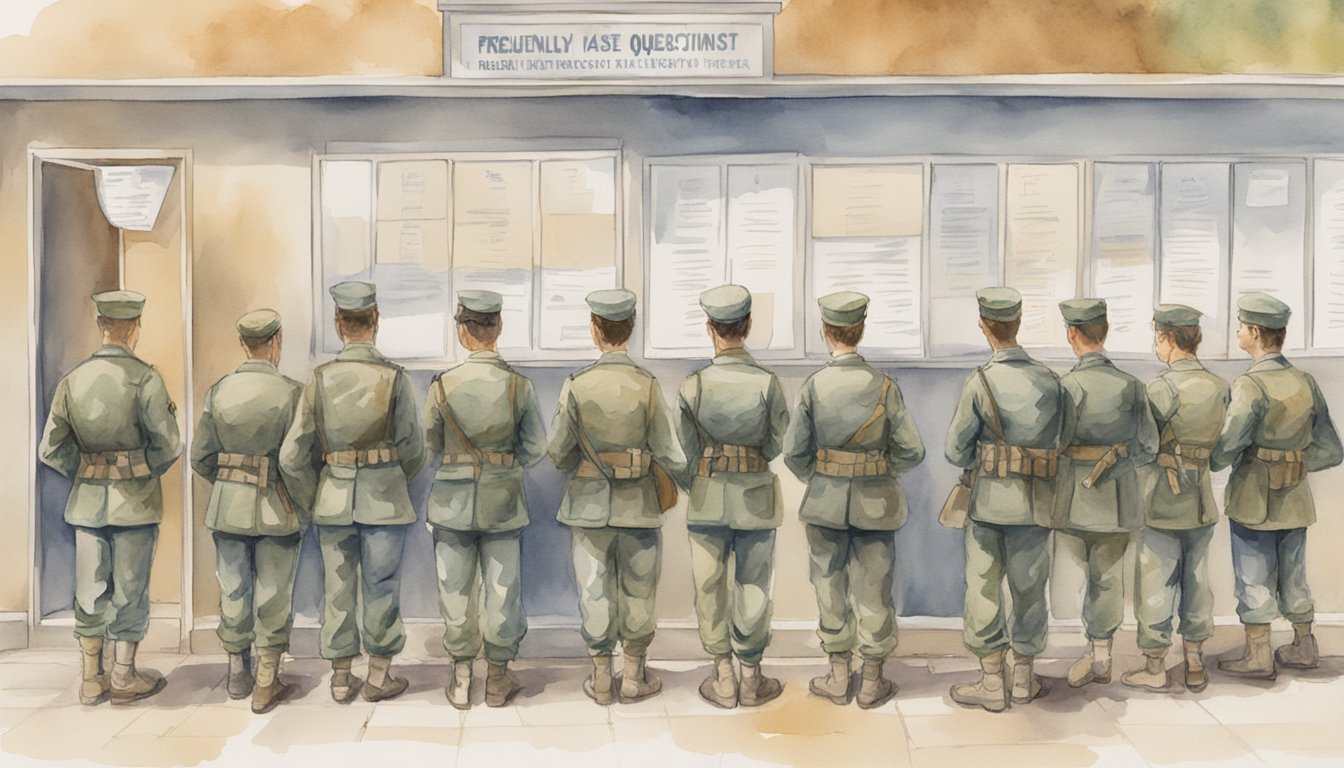
In military basic training, recruits receive essential immunizations to protect their health and ensure mission readiness.
Below, you will find answers to common questions about these vaccinations.
What immunizations are required during Army basic training?
During Army basic training, recruits receive the MMR vaccine (Measles, Mumps, Rubella) regardless of their vaccination history.
They also get the quadrivalent meningococcal vaccine, which covers A, C, Y, and W-135.
How many and which vaccines are administered in Air Force basic training?
In Air Force basic training, you receive multiple vaccines in the first few weeks.
These include vaccines for influenza, hepatitis A and B, and polio, among others. Medical processing is intensive in the initial phases to ensure everyone is protected.
Are there any specific vaccines that are mandatory before military deployment?
Yes, depending on where you will be deployed, additional vaccines are often required.
These may include vaccines for diseases like yellow fever, typhoid, and Japanese encephalitis.
The specific requirements depend on the health risks in the deployment area.
Has the list of vaccines given to military personnel changed since the 1990s?
The list of vaccines has evolved since the 1990s to address emerging health threats.
Modern vaccines now include protection against newer viruses and diseases, adapting to changes in global health situations and deployment risks.
What are the vaccination requirements for Navy personnel?
Navy recruits receive a similar set of vaccines to other branches, including MMR, hepatitis B, and influenza.
The exact list might vary based on the individual’s health status and deployment location.
Is the anthrax vaccine still part of the military vaccine protocol?
The anthrax vaccine is still part of the military protocol for certain personnel.
It is given to those who will be deployed to high-risk areas where anthrax could be used as a biological weapon or is otherwise a concern.






